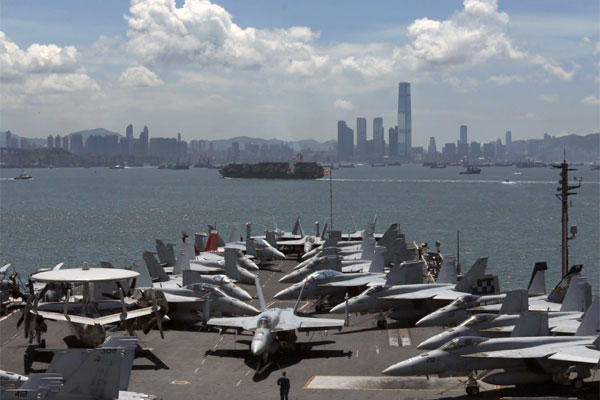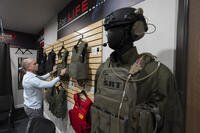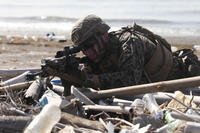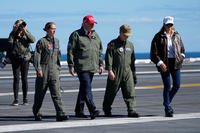President Obama and Vice President Joe Biden were on separate trips this week that were linked by the crisis in Ukraine and the conflicting calls from allies in Europe and Asia for more U.S. troops.
Biden arrived Monday in Ukraine bringing pledges of U.S. assistance and support for the struggling Kiev government in the faceoff with Russia over the separatist takeover of cities in eastern Ukraine.
On Tuesday, Obama was leaving for Asia to assure allies of the U.S. commitment to the so-called "Pacific pivot," or rebalance of the U.S. military to the Asia-Pacific region, despite the demand for more U.S. forces in Europe to contain Moscow.
In Kiev, Biden was meeting with acting Prime Minister Arseniy Yatsenyuk, acting President Oleksandr Turchynov, and legislators from around the country to give promises of U.S. economic assistance and and support for Ukraine's territorial integrity.
Biden was met at the airport by U.S. Ambassador Gregory Pyatt, who warned that the agreement reached in Geneva last week to defuse the crisis in eastern Ukraine could fall apart and lead the U.S. to impose more sanctions on Russia.
"It's still too early to tell if this is going to succeed," Pyatt said of the Geneva agreement reached by Russia, the U.S., Ukraine and the European Union.
The pact called for the disbanding of separatists who have taken over government buildings in at least 10 eastern Ukraine cities."The ball is really in Moscow's court in terms of whether they're going to take this diplomatic off ramp," Pyatt said.
At the State Department, spokeswoman Jen Psaki said Secretary of State John Kerry had phoned Russian Foreign Minister Sergei Lavrov to warn that the U.S. and its allies were prepared to impose tougher economic sanctions on Russia within days if the separatists did not cooperate.
Kerry "urged Russia to take concrete steps to help implement the Geneva agreement, including publicly calling on separatists to vacate illegal buildings and checkpoints, accept amnesty and address their grievances politically," Psaki said.
In a Moscow news conference Monday, Lavrov said that the three persons killed in a shootout Sunday at a checkpoint near the eastern Ukrainian town of Slavyansk showed that the Kiev government was not interested in compromise.
"The authorities are doing nothing, not even lifting a finger, to address the causes behind this deep internal crisis in Ukraine," he said.
Before and after meetings last week with Defense Secretary Chuck Hagel, Polish Defense Minister Tomasz Siemoniak urged the U.S. and NATO to bolster defenses in Eastern Europe, build a permanent base in Poland and reconsider the Pacific pivot.
The rebalance of forces to the Pacific failed to take into account the need to protect NATO allies and offset Russian designs on eastern Ukraine, Siemoniak said in an interview with the Washington Post.
"Events show that what is needed is a re-pivot," he said.
On Tuesday, Obama was leaving for Japan, South Korea, Malaysia and the Philippines to focus on trade and security issues in what was a makeup trip for his cancelled visit last year due to the government shutdown.
The trip was meant to assure skittish allies in Asia that the U.S. commitment to the pivot was real, said Sheila Smith, an Asia expert at the Council on Foreign Relations.
"We've been distracted a bit by Syria and Ukraine," Smith said in a conference call with reporters.
Earlier this month, Defense Secretary Chuck Hagel on his own visit to the region cited the Ukraine crisis in a rebuke to China for its territorial claims to disputed islands in the South China Sea.
"You cannot go around the world and redefine boundaries and violate territorial integrity and sovereignty of nations by force, coercion and intimidation whether it's in small islands in the Pacific or large nations in Europe," Hagel said.
-- Richard Sisk can be reached at richard.sisk@monster.com




























